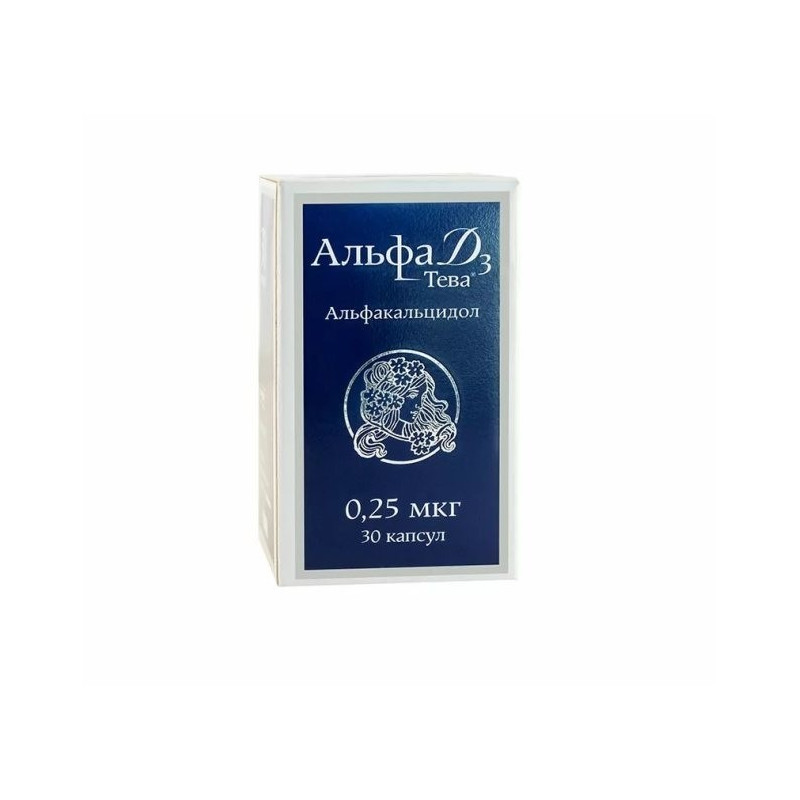



 All payments are encrypted via SSL
All payments are encrypted via SSL
 Full Refund if you haven't received your order
Full Refund if you haven't received your order
Red-brown soft gelatin capsules:
1 capsule contains alfacalcidol 0.25 mcg;
Excipients: anhydrous citric acid, propyl gallate, vitamin E, absolute ethanol, peanut butter;
30 or 60 pcs. packaged.
Alpha D3-Teva - a drug that regulates the exchange of Calcium and phosphorus. Increases the absorption of calcium and phosphorus in the intestines, increases their reabsorption in the kidneys, enhances bone mineralization, reduces the level of parathyroid hormone in the blood.
Alpha D3Teva restores the positive calcium balance in the treatment of calcium malabsorption, thereby reducing the intensity of bone resorption, which helps to reduce the incidence of fractures.
In the course of use of the drug, there is a decrease in bone and muscle pain associated with impaired calcium-phosphorus metabolism, improved coordination of movements.
- osteoporosis (including postmenopausal, senile, steroid);
- osteodystrophy in chronic renal failure;
- hypoparathyroidism and pseudo-hypoparathyroidism;
- hyperparathyroidism (with damage to the bones);
- rickets and osteomalacia associated with malnutrition or absorption;
- hypophosphatemic vitamin D-resistant rickets and osteomalacia;
- pseudo-deficient (vitamin D-dependent) rickets and osteomalacia;
- Fanconi syndrome (hereditary renal acidosis with nephrocalcinosis, late rickets and adiposogenital dystrophy);
- renal acidosis.
- hypercalcemia;
- hyperphosphatemia (with the exception of hyperphosphatemia in hyperparathyroidism);
- hypermagnesium;
- intoxication with vitamin D;
- lactation;
- Hypersensitivity to the drug.
Alpha D Capsules3-Teva taken by mouth. The duration of the course is determined by the doctor individually in each case and depends on the nature of the disease, the effectiveness of therapy. In some cases, the drug is used throughout life.
For adults at rickets and osteomalacia, caused by exogenous vitamin D deficiency, gastrointestinal diseases or long-term anticonvulsant therapy, the drug is prescribed in a dose of 1-3 mg / day.
At hypoparathyroidism the daily dose is 2-4 mcg.
At osteodystrophy in chronic renal failure daily dose - up to 2 mcg.
At Fanconi syndrome and renal acidosis the drug is prescribed in a daily dose of 2-6 μg.
At hypophosphatemic rachitis and osteomalacia daily dose is 4-20 mcg.
At postmenopausal, senile, steroid and other types of osteoporosis the daily dose is 0.5-1 μg.
It is recommended to begin treatment with the minimum indicated doses, controlling calcium and phosphorus levels in plasma once a week.The dose of the drug can be increased by 0.25-0.5 mcg / day to stabilize the biochemical parameters. When the optimal effective dose is reached, it is recommended to control the level of calcium in the blood plasma every 3 months.
Children weighing less than 20 kg the drug is prescribed at 0.01-0.05 mg / kg / day, children weighing 20 kg and above - 1 mcg / kg / day (except for cases of renal osteodystrophy).
At renal osteodystrophy the dose is 0.04-0.08 mkg / kg / day.
From the metabolic processes: rarely, hypercalcemia; very rarely, a slight increase in HDL in the plasma. In patients with severe renal impairment, hyperphosphatemia may develop.
Gastrointestinal: nausea, dry mouth, discomfort in the epigastric region, constipation; rarely - a slight increase in ALT, AST in plasma.
From the side of the central nervous system: rarely - weakness, fatigue, dizziness, drowsiness.
Cardiovascular: rarely - tachycardia.
Allergic reactions: rarely - skin rash, itching.
In pregnancy, alfacalcidol is prescribed only by absolute indications.
The drug is contraindicated for use during lactation.
With caution, the drug is prescribed to patients with a tendency to hypercalcemia. During the period of use of the drug, it is necessary to regularly determine the level of calcium in the blood plasma.
In the presence of biochemical signs of normalization of the structure of the bone (normalization of the alkaline phosphorus phosphate in the blood plasma), a corresponding reduction in the dose of Alpha D3- Teva, which allows to avoid the development of hypercalcemia.
Hypercalcemia or hypercalciuria can be corrected by discontinuing the drug and reducing calcium intake until plasma calcium levels return to normal. As a rule, this period is 1 week. Therapy can then be continued, starting at half the last dose applied.
Symptoms: weakness, lethargy, dizziness, headache, nausea, dry mouth, constipation, diarrhea, heartburn, vomiting, epigastric pain, abdominal pain, bone pain, itching, feeling of palpitations.
Treatment: cancel the drug. In the early stages of acute overdose, gastric lavage and / or the appointment of mineral oil may have a positive effect (which reduces absorption and increases the excretion of the drug with feces). In severe cases, isotonic solution of sodium chloride is injected into IV, loop diuretics are prescribed, GCS.
In the treatment of osteoporosis, it can be administered in combination with estrogens and antiresorptive drugs of different groups.
With the simultaneous use of alpha D3-Teva with digitalis increases the risk of developing heart rhythm disorders.
If administered concurrently with barbiturates, anticonvulsants and other drugs that activate microsomal oxidation enzymes in the liver, a higher dose of Alpha D must be used.3- Teva.
The absorption of alfacalcidol is reduced when it is combined with mineral oil (for a long time), Kolestiramine, Colestipol, sucralfate, antacids, and albumin-based preparations.
When used simultaneously with Alpha D3-Teva antacids or laxative dialysis increases the risk of hypermagneemia.
The simultaneous administration of calcium, thiazide diuretic drugs increases the risk of hypercalcemia.
Against the background of therapy Alpha D3-Teva should not be prescribed vitamin D and its derivatives because of the possible additive interaction and an increase in the risk of developing hypercalcemia.
The drug should be stored at room temperature.
Alpha D3-Teva